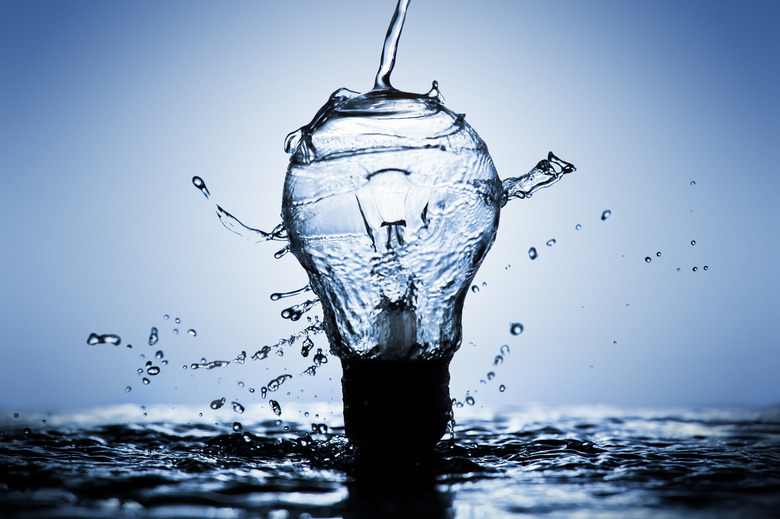What Happens If Electricity Hits Water?
If you've never heard that it's dangerous to go swimming during a lightning storm, consider yourself warned. The water in natural sources, such as lakes and streams, as well that in pools and hot tubs, is an excellent electricity conductor, and if you're in contact with the water when lightning hits, you'll probably be electrocuted. However, it's not the water itself that's the problem; distilled water wouldn't carry the same risk. The minerals dissolved in natural water and pool water are responsible its conductivity. They turn pure water, which is an electrical insulator, into an electrolyte.
TL;DR (Too Long; Didn't Read)
Electricity flows through water because it contains ions of dissolved salts and metals. Distilled water, which does not contain impurities, does not conduct electricity.
It's All About the Ions
It's All About the Ions
Ions are electrically charged particles, and they are in virtually every natural water sample. They are common because water is so good at dissolving minerals. Salts, such as sodium chloride (table salt) and magnesium sulfate (epsom salts), are made up of oppositely charged ions, and these break apart in water by virtue of the polar attraction of water molecules. Once apart, they are free to roam around in solution, and they stay that way until the water evaporates or their concentration reaches the saturation point and some of them settle out. Ions from metals, such as iron and manganese, similarly dissociate from the solid state because of the polar attraction of water molecules.
Electrolytes, Lightning and Hair Dryers
Electrolytes, Lightning and Hair Dryers
The ions suspended in water turn it into an electrolyte. By itself, an electrolyte usually has no net charge because it contains a balanced number of positive and negative ions. However, when you introduce an electric voltage, the ions align with the polarity of the charge and create a current throughout the fluid.
Electrolytes can conduct very small currents, which is why they are so important to the human body. They can also conduct very large currents. When lightning hits a pool, stream, puddle or even wet ground, it momentarily charges all the water with millions of volts of lethal electricity. A hair dryer operates at much lower voltage, but if you drop one in your bath tub while you're in it, it can be just as lethal, because the electricity continues to flow as long as the appliance is plugged in and the breaker doesn't blow.
Is Distilled Water Really Safer?
Is Distilled Water Really Safer?
Distillation produces water that is free of the dissolved impurities that make it an electrolyte, and in this state, water is actually an electric insulator. In laboratory conditions, scientists have found that distilled water has an insulating capability comparable to glass, plastic, ceramic and air.
But before you think a tub or pool filled with distilled water could actually provide some protection from electricity, remember that while air is an insulator, it can't stop lightning, and the water probably couldn't either. A tub of distilled water might prevent you from being electrocuted by your hair dryer, but keep in mind that distilled water doesn't stay pure for long when salts from the body, or a dirty tub surface, start to dissolve in the water.
Cite This Article
MLA
Deziel, Chris. "What Happens If Electricity Hits Water?" sciencing.com, https://www.sciencing.com/happens-electricity-hits-water-8507258/. 13 April 2018.
APA
Deziel, Chris. (2018, April 13). What Happens If Electricity Hits Water?. sciencing.com. Retrieved from https://www.sciencing.com/happens-electricity-hits-water-8507258/
Chicago
Deziel, Chris. What Happens If Electricity Hits Water? last modified March 24, 2022. https://www.sciencing.com/happens-electricity-hits-water-8507258/
